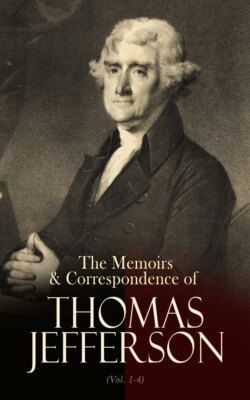Читать книгу The Memoirs & Correspondence of Thomas Jefferson (Vol. 1-4) - Thomas Jefferson - Страница 99
На сайте Литреса книга снята с продажи.
LETTER LXXIX.—TO JOHN ADAMS, July 28, 1785
ОглавлениеTable of Contents
TO JOHN ADAMS.
Paris, July 28, 1785.
Dear Sir,
Your favors of Jury the 16th and 18th came to hand the same day on which I had received Baron Thulemeyer’s, enclosing the ultimate draught for the treaty. As this draught, which was in French, was to be copied into the two instruments which Dr. Franklin had signed, it is finished this day only. Mr. Short sets out immediately. I have put into his hands a letter of instructions how to conduct himself, which I have signed, leaving a space above for your signature. The two treaties I have signed at the left hand, Dr. Franklin having informed me that the signatures are read backwards. Besides the instructions to Mr. Short, I signed also a letter to. Mr. Dumas, associating him with Mr. Short. These two letters I made out as nearly conformably as I could, to your ideas expressed in your letter of the 18th. If any thing more be necessary, be so good as to make a separate instruction for them, signed by yourself, to which I will accede. I have not directed Mr. Dumas’s letter. I have heretofore directed to him as ‘Agent for the United States at the Hague,’ that being the description under which the journals of Congress speak of him. In his last letter to me, is a paragraph, from which I conclude that the address I have used is not agreeable, and perhaps may be wrong. Will you be so good as to address the letter to him, and to inform me how to address him hereafter. Mr. Short carries also the other papers necessary. His equipment for his journey requiring expenses which cannot come into the account of ordinary expenses, such as clothes, &,c. what allowance should be made him? I have supposed somewhere between a guinea a day, and one thousand dollars a year, which I believe is the salary of a private secretary. This I mean as over and above his travelling expenses. Be so good as to say, and I will give him an order on his return. The danger of robbery has induced me to furnish him with only money enough to carry him to London. You will be so good as to procure him enough to carry him to the Hague and back to Paris. The confederation of the King of Prussia with some members of the Germanic body, for the preservation of their constitution, is, I think, beyond a doubt. The Emperor has certainly complained of it in formal communications at several courts. By what can be collected from diplomatic conversation here, I also conclude it tolerably certain, that the Elector of Hanover has been invited to accede to the confederation, and has done or is doing so. You will have better circumstances however, on the spot, to form a just judgment. Our matters with the first of these powers being now in conclusion, I wish it was so with the Elector of Hanover. I conclude, from the general expressions in your letter, that little may be expected. Mr. Short furnishing so safe a conveyance that the trouble of the cipher may me dispensed with, I will thank you for such details of what has passed, as may not be too troublesome to you.
The difficulties of getting books into Paris, delayed for some time my receipt of the Corps Diplomatique left by Dr. Franklin. Since that, we have been engaged with expediting Mr. Short. A huge packet also, brought by Mr. Mazzei, has added to the causes which have as yet prevented me from examining Dr. Franklin’s notes on the Barbary treaty. It shall be one of my first occupations. Still the possibility is too obvious that we may run counter to the instructions of Congress, of which Mr. Lambe is said to be the bearer. There is a great impatience in America for these treaties. I am much distressed between this impatience and the known will of Congress, on the one hand, and the uncertainty of the details committed to this tardy servant.
The Duke of Dorset sets out for London to-morrow. He says he shall be absent two months. There is some whisper that he will not return, and that, Lord Carmarthen wishes to come here. I am sorry to lose so honest a man as the Duke. I take the liberty to ask an answer about the insurance of Houdon’s life.
Congress is not likely to adjourn this summer. They have passed an ordinance for selling their lands. I have not received it.
What would you think of the enclosed draught to be proposed to the courts of London and Versailles? I would add Madrid and Lisbon, but that they are still more desperate than the others. I know it goes beyond our powers; and beyond the powers of Congress too; but it is so evidently for the good of all the States, that I should not be afraid to risk myself on it, if you are of the same opinion. Consider it, if you please, and give me your thoughts on it by Mr. Short: but I do not communicate it to him, nor any other mortal living but yourself.
Be pleased to present me in the most friendly terms to the ladies, and believe me to be, with great esteem,
Dear Sir, your friend and servant,
Th: Jefferson.
